Here’s a look at all of our recommended films for SIFF’s opening week, May 21 through 26. Follow all our SIFF coverage on our special SIFF page, updated daily with reviews, news, and gossip.Published on May 19, 2009

Gotta Dance: Age doesn’t matter unless you’re a cheese, this documentary tells us (quoting Florenz Ziegfeld). But age does matter: the featured group of 60-and-older performers has to overcome a number of age-related obstacles–from self-consciousness to utter unfamiliarity with hip-hop to decades of muscle memory of performing the wrong types of dances–to become the NETsationals, the NBA’s first senior dance team, which supports the New Jersey Nets. They’re a diverse bunch. For example, there’s a kindergarten teacher, a former bombshell who lost her husband to a Playboy bunny. Another woman who spent World War II in hiding in the Philippines. But they’re all old, and they all decide they want to go in front of tens of thousands of basketball fans and perform dances usually reserved for lithe, spandex-clad 20-somethings. There’s underdog drama aplenty–first-night jitters and, later, the harsh realities of the business of show. But Gotta Dance goes beyond that and delves into the lives of some impressive individuals who refuse to stop growing, even in their golden years. (NR) REVIEW BY DAMON AGNOS SIFF Cinema: 4 p.m., Mon., May 25 (Also: Kirkland Performance Center, 4:30 p.m. Wed., June 3.)
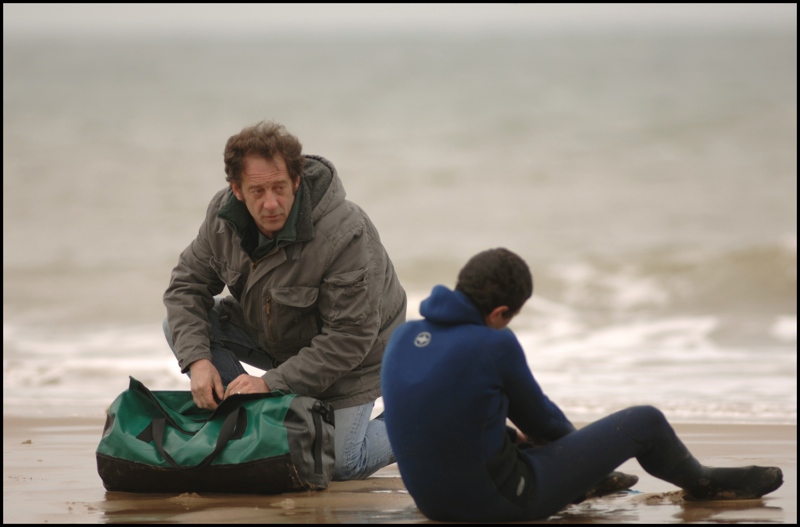
Welcome: Europeans–the filmmakers, at least–are fascinated with the subject of immigration. Recent dramas like Michael Winterbottom’s In This World have been unsparing in their view of Fortress Europe, which slams the door on refugees from countries destabilized by the wars and politics of the West. From France, Philippe Lioret’s Welcome tackles the same topic, though with more of a conventional coach-and-athlete Rocky approach. The coach (Vincent Lindon) is a middle-aged former swimming star who now leads water aerobics classes at a municipal pool in Calais, on the English Channel. The athlete is a 17-year-old Kurdish Iraqi refugee trying to reach his girlfriend in London. He fails at other avenues of smuggling (boat, truck, etc.), so you can guess his next thought when he shows up at the pool for a swimming lesson. It’s illegal to help the refugees who huddle outside a Red Cross feeding station, where the coach’s soon-to-be ex-wife volunteers. He wants to impress her. But, more than that, he’s lonely; and the couple had no kids. Yes, formula is strongly at work here, but Casablanca was formulaic, too. And the veteran actor Lindon some of that same Bogart weariness: the burden of ideals one dares not show, the yearning of a cause worth fighting for. (NR) REVIEW BY BRIAN MILLER Harvard Exit: 4 p.m., Sun., May 24 (also 9:15 p.m. Tues., June 2).
Pop Star on Ice: Why hasn’t this guy hosted Saturday Night Live yet? Give the man a TV show already! Even if figure skater Johnny Weir doesn’t win a medal at next year’s Winter Olympic Games in Vancouver (he choked at Torino ’06), he’s got what few elite athletes possess: wit, self-awareness, flamboyance, and a love of show biz. Gee–doesn’t that sound kind of gay? Exactly. Those who follow the sport already know Weir’s not-so-secret secret, which he never exactly confirms with adoring female fans or disapproving officials. But for us outsiders (non-gay, non-skater, or both), this nimble documentary makes it a pleasure to meet the 24-year-old skater. Lithe, androgynous, graceful (duh), he lives his life as performance off the ice, too (though the camera surely encourages him). Sitting in the tub with his boyfriend, he creates a hilarious female Russian journalist character–with spot-on accent–to get the dirty truth about Weir. A timeline takes us back and forth among a blur of competitions, and we follow on the inevitable visit to Johnny’s childhood home in Pennsylvania. There, he learned to ice skate at the late age of 12 on a frozen pond perforated with corn stalks. But Weir claims no traumas, and seems to have lived a life remarkably free of homophobia. However, NBC clearly demanded money for its HD Olympic broadcast video that the filmmakers couldn’t afford, so the quality of competition footage is lacking. And there are big gaps in the film: What does Weir’s father, a bearded, bearish, blue-collar-looking dude, think of his son’s fame and career? HeA¢a‚¬a„¢s just a silent figure on the periphery. But Weir is happy to have the spotlight instead. (NR) REVIEW BY BRIAN MILLER Egyptian: 6:45., Sun., May 24 (Also: Kirkland Performance Center, 11 a.m. Fri., June 5.)
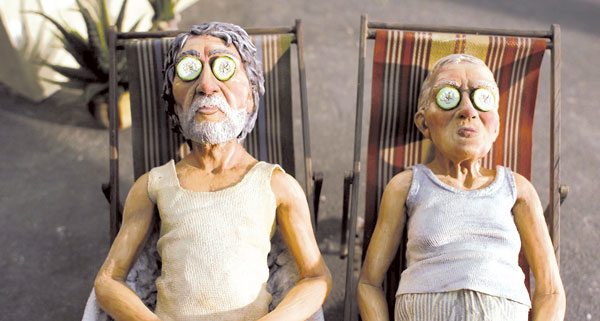
$9.99: The stop-motion animated puppets in Tatia Rosenthal’s beguiling first feature look like clay-mated slabs of glazed meat, at once unreal and hyper-real. Which makes them perfect carriers of the off-kilter existentialism of Etgar Keret, who co-wrote the screenplay for $9.99 with Rosenthal, based on his own short stories. With Keret you never know where laughter ends and heartbreak begins, and so it is with these lost souls (voiced by Geoffrey Rush, Anthony LaPaglia and other luminaries of this Israeli-Australian co-production) who keep colliding in a naturalistically evoked apartment building that could be found in any warm-climate city, whether Tel Aviv, Sydney or Los Angeles. Their gait is stiff, but they’re tormented by the full range of emotional incompleteness, from shame to lust to longing to confusion to plain old weariness with the struggle to stay afloat. There’s more fun than mawkishness, though, in the underachiever who evades his fiancee’s demands by cavorting with 2-inch-high frat boys, the suicidal (maybe) Guardian Angel (maybe) who’d rather be anywhere but here, the penthouse hottie who likes her men absolutely hairless, and the 20-something who seeks solace in a $10 life manual because his loving, single father has no time to listen. The cutrate how-to proves more potent than you’d think, which says something wise and wonderful about the way the material world can hold out ridiculous but transcendent spiritual release. I’m not revealing how, but let’s just say that $9.99 doesn’t end like that other movie about the pursuit of happyness, and all the better for it. (NR) REVIEW BY ELLA TAYLOR Harvard Exit: 9:30 p.m., Sun., May 24 (also 4:30 p.m. Thurs., May 28).
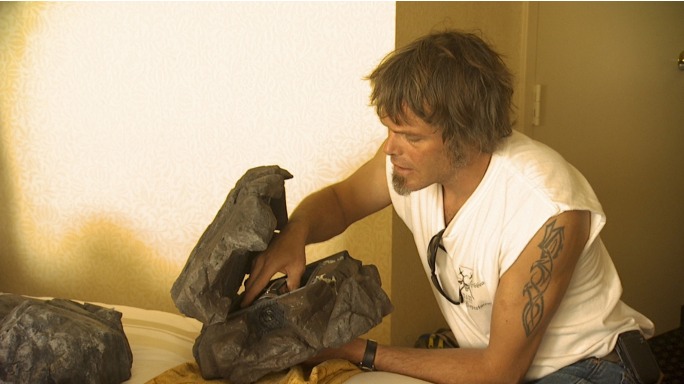
The Cove: I was buying a new Porsche every year, says a rueful Ric O’Barry, who as a young man was instrumental in the ’60s TV show Flipper. He caught and trained several dolphins who made the program a hit (inspiring countless divers and marine biologists along the way); then when the show was canceled and its mammalian stars abandoned, he claims his favorite, Cathy, committed suicide in his arms. Go ahead and cry now, because this Sundance prize-winning documentary gets even heavier. O’Barry was radicalized by his Flipper experience, and dedicated his life to freeing or protecting the thousands of dolphins that, because of Flipper, became profitable trained attractions for commercial aquariums around the world. The Cove director Louie Psihoyos, himself a diver and environmentalist, here follows O’Barry and a Dirty Dozen-style brigade of eco-activists to Taiji, Japan where migratory dolphins are corralled by the thousand in a hidden cove. A few are sold to marine parks for six figures an animal. The rest, well, imagine the worst. The Cove is, in a way, the companion documentary to a real-life horror movie, a maritime snuff film. Few SIFFgoers will have a guilty conscience about eating dolphin meat (which carries dangerous levels of mercury), but some will have to explain to their kids why the summer trip to SeaWorld is being cancelled (NR) REVIEW BY BRIAN MILLER Egyptian: 3:45 p.m., Sun., May 24 (Also: Neptune, 6:30 p.m. Mon., May 25.)

We Live in Public: Ondi Timoner’s Sundance prize-winning doc follows obsessive self-documenter Josh Harris on his decade-long odyssey from multi-millionaire Internet pioneer to Manhattan art-world cause celebre to bankrupt (financially and emotionally), mentally unhinged exile. In 1999, before reality TV boomed or the words MySpace, Facebook, and YouTube had entered the lexicon, it was Harris who launched the underground art project Quiet: We Live in Public, in which 100 like-minded exhibitionists lived for 30 days in open cells under the constant scrutiny of video cameras and Orwellian interrogators. Timoner (DiG!) was there from the start, and she stuck around for Harris’ equally catastrophic second act, in which he and his then-girlfriend equipped their apartment with wall-to-wall surveillance cameras and proceeded to live their lives, for your viewing pleasure, at the website weliveinpublic.com. Harris’ gradual implosion is both repellent and mesmerizing, Timoner’s film unsparing in its scrutiny. She films, therefore he is. (NR) REVIEW BY SCOTT FOUNDAS Neptune: 7 p.m., Sat., May 23 (Also: Egyptian, 11 a.m. Mon., May 25.)
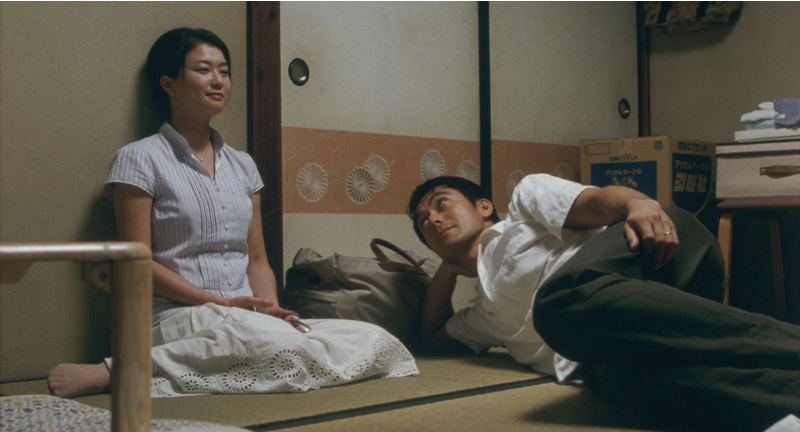
Still Walking: Hirokazu Koreeda’s touching, acutely observed drama about a 24-hour gathering of the Yokoyama clan–together for their annual remembrance of a deceased son–dissects family allegiances and fissures with uncommon grace. As the surviving son (Hiroshi Abe), his sister (You), and respective spouses and broods settle in at their elderly parents’ seaside home, quotidian events–meal-planning, children playing–subtly shift to the more emotionally raw realm of buried resentment and disappointment, and the futile efforts for parental approval. (NR) REVIEW BY MELINDA ANDERSON Harvard Exit: 7 p.m. (Also: Pacific Place, 11 a.m., Sat., May 23 Fri., May 29.).
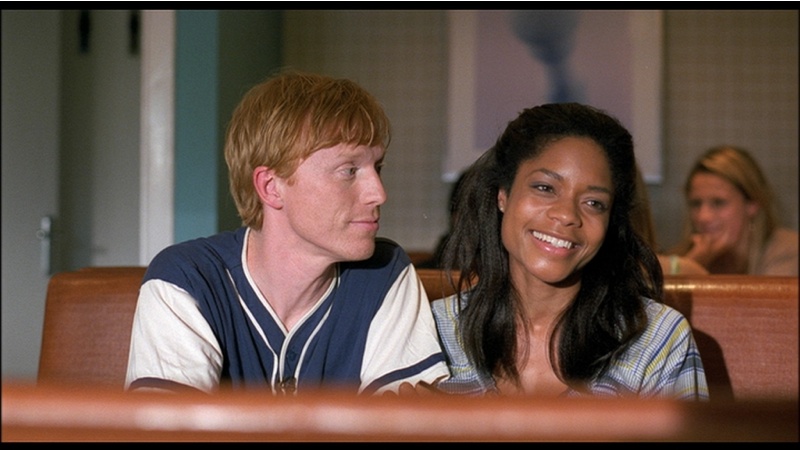
Morris: A Life With Bells On: There had better be a big royalty check to Christopher Guest for this one. The mock doc follows dancer Derecq Twist (writer/star Charles Thomas Oldham) from his rural English village to the bright lights of Hollywood and beyond, while we–and the world–discover the supposed folk dance phenomenon that is the Morris. A shy, pasty-white, virginal tractor mechanic, Derecq is transformed into an intense, beribboned, high-stepping, hankie-waving competitor when his troupe meets rival squads. (One is led by the priceless Ian Hart in Rambo-meets-Riverdance mode.) Somehow, Derecq must coach his team of yokels into strict Morris discipline by imparting the three P’s: passion, practice, and the desire to be the best. Stretched to 101 minutes, the film does runs out of steam, but your smile will last from the first hour. Director Lucy Akhurst plays the team’s trainer, while Derek Jacobi shows up as the evil corporate overlord of folk dancing, which is said to be a multi-billion dollar enterprise. Well, they’ve got my money. (NR) REVIEW BY BRIAN MILLER SIFF Cinema: 11 a.m., Sat., May 23 (also 7 p.m. Sun., May 24).

I’m No Dummy: A documentary about ventriloquists–or vents, as those in the trade call themselves–sounds like a Christopher Guest mockumentary, a put-on. What’s next–mimes or children’s birthday clowns? But anyone with a memory extending back to ’50s or ’60s TV programming, and later the Johnny Carson show, and still later Soap, will find this doc unexpectedly fascinating. On the ’70s sitcom parody Soap, for instance, that possibly insane blonde guy with the dummy he couldnaE™t control is Jay Johnson, who lately earned a Tony Award for his stage act. He and other present masters of the craft are knowledgeable interviewees, with a strong connection personal connection to the early TV pioneers. (Old television clips are amazing, including the famous Senor Wences.) The circle of vents is small and tight-knit, and also likely shrinking. After the form graduated vaudeville to nightclubs to early TV networks (which needed cheap programming), ventriloquism appears to be receding to regional theaters and Branson, Missouri. If not quite a lost art today, in a few more decades I’m No Dummy may serve as a nice eulogy. (NR) REVIEW BY BRIAN MILLER SIFF Cinema: 6:45 p.m., Sat., May 23 (Also: Pacific Place, 4 p.m. Sun., May 24 and Kirkland Performance Center, 7 p.m. Wed., June 3.)
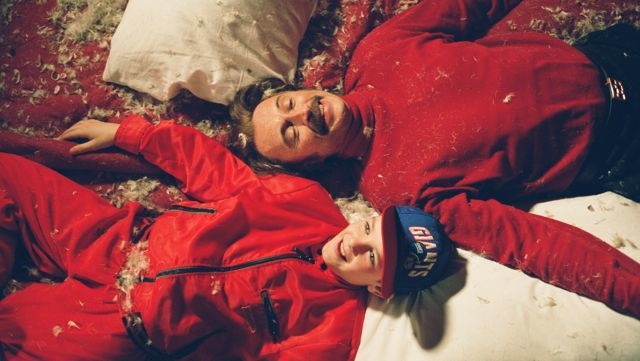
I Know You Know: Robert Carlyle can always be relied upon as an interesting actor. Here he plays a suave English superspy in the late ’80s–or so his son believes–with verve and panache. He springs off a private jet and into an exotic sports car; he makes mysterious phone calls in the middle of the night; he carries a gun; he wears the very latest fashions (or at least they were in the early ’80s). Something’s not right about Charlie as he so boldly blusters his way through life. And soon his 11-year-old son Jamie (Arron Fuller, just another excellent British child actor) begins to wonder the same thing: Why do they live in a tatty Wales flat? Why are they now driving an old beater Mercury? And why does Charlie think their flat is bugged? Who’s listening to them, who’s following them, where is the source of this unseen menace? Writer-director Justin Kerrigan says his own childhood is the basis for this embellished tale. I’m Britain’s No. 1 agent! Charlie insists to his son, but Britain itself is in decline in I Know You Know. The coal mines are closing and men are being made redundant in Margaret Thatcher’s new England. In that economic reality, the panic and pain Carlyle expresses is that of 007 being demoted to zero. (NR) REVIEW BY BRIAN MILLER Egyptian: 1 p.m. (Also: Uptown, 7 p.m. Mon., May 25.)
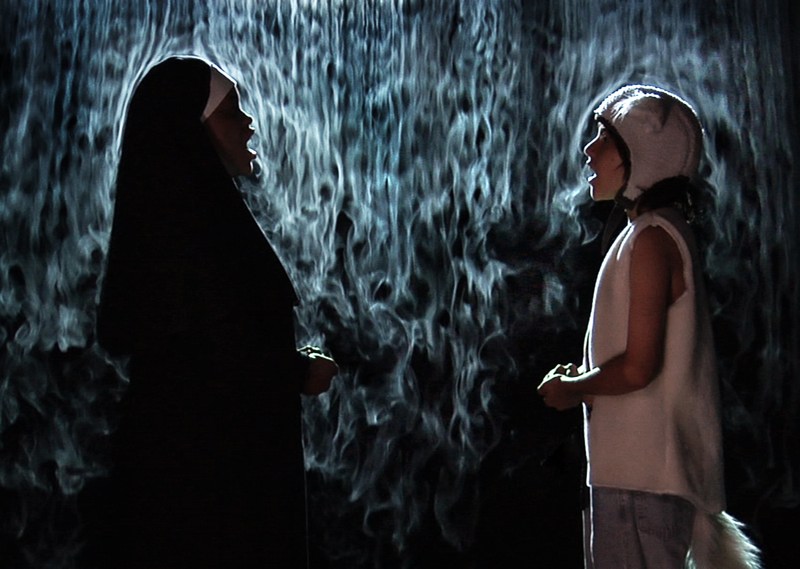
Fig Trees: Beyond category. It’s a documentary about AIDS activists. It’s an opera. There’s a kid in a squirrel suit. Maria Callas appears. Tom Hanks gets looped in from Philadelphia, and there’s a countdown of the greatest AIDS pop song ever. Gertrude Stein and Virgil Thomson create Four Saints in Three Acts, traveling back and forth through time. We learn about palindromes and reverse musical scores. And there’s even a trip to the zoo. The AIDS activists are Tim McCaskell (in Canada) and Zackie Achmat (in South Africa), who may never have met, but director John Greyson uses their lives as an artistic springboard into the realms of opera, queer theory, theater history, the lives of the saints (not strictly adhering to the Bible, mind you), the politics of antiretroviral drug therapy, and, of course The Matrix. (All roads lead to The Matrix.) If there’s a more audacious, imaginative film at SIFF this year, I haven’t seen it yet. And don’t get me started on the double-amputee dude playing the piano, because I don’t want to drag in David Lynch. (NR) REVIEW BY BRIAN MILLER Pacific Place: 11 a.m., Sat., May 23 (also 7:15 p.m. Tues., May 26).
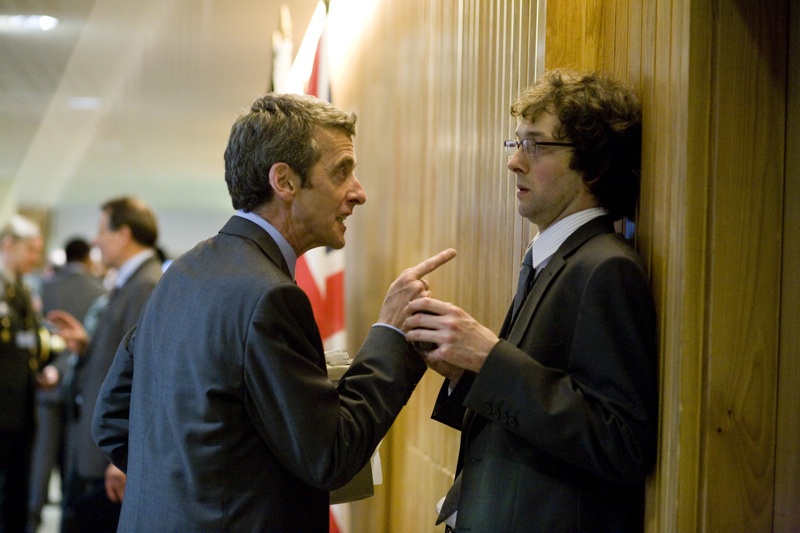
In the Loop: Wait–they’re showing a British TV satire for SIFF’s gala opener? Not exactly. The creative team behind the BBC’s The Thick of It has reunited much of the original cast, added a few Yanks (led by James Gandolfini in the Colin Powell role), and rewritten history — the lead-up to the Iraq War, though Iraq is never mentioned — into a transatlantic political farce. I loved it. The movie is talk talk talk, interrupted by a little sex and drinking, then back to the talking, which soon becomes shouting, screaming, and cursing. The Brits are led by Peter Capaldi, who plays a foul-mouthed and thoroughly frightening Scotsman at a British government ministry. We’ve all heard of the Boss From Hell. Well, Capaldi’s Malcolm Tucker is the boss to whom all the underling Bosses From Hell report. Around him swirl doctored intelligence reports, leaks, blunders, and neocon ideologues. The latter fly especially thick when In the Loop jets over to Cheneyland, a.k.a. Washington, DC, where the younger Brit bureaucrats meet their American counterparts. (Look! There’s Anna Chlumsky, the girl from My Girl way back when.) Steve Coogan has a small supporting role, but the movie is Capaldi’s, Walk the fucking line! he barks at a polite, weak, idealistic MP Tom Hollander, who later asks himself, Is the really brave thing doing what you don’t believe? Well, in politics I guess you can convince yourself of anything. (NR) REVIEW BY BRIAN MILLER Paramount: 7 p.m., Thurs. May 21

Burma VJ: Reporting From a Closed Country: How we view the relationship between traditional and new media should forever be changed by Danish filmmaker Anders Ostergaard’s terrific documentary about a loosely organized network of scrappy underground videographers who risked their lives photographing the abortive 2007 uprising against Myanmar’s military dictatorship. Spooked by memories of a similar rebellion in 1988, the government shut down the Internet and local media, and banned foreign journalists from covering the demonstrations, which were led by Buddhist monks and students with growing support from an emboldened public. Burma VJ takes us on a roller coaster of alternating hope and despair as the young guerrilla reporters, always on the lookout for ubiquitous informers, wade into the thick of the struggle with Handycams hidden in bags, then transmit the footage to a hidden colleague, who smuggles it out of the country via satellite. The raw, shocking images of courage and brutal backlash, here enhanced by added voiceover from two anguished young cameramen, were then broadcast, uncanned and unpolished, by the mainstream media. There was no happy ending, but if Burma VJ’s account of the efficacy of dictatorship threatens to crush you, the sight of a sturdy young back disappearing into the mountains, returning from a Thailand hideout for another round of bearing witness, should make your heart burst. (NR) REVIEW BY ELLA TAYLOR Pacific Place: 9:30 p.m., Sat., May 23 (also 5 p.m. Sun., May 24).
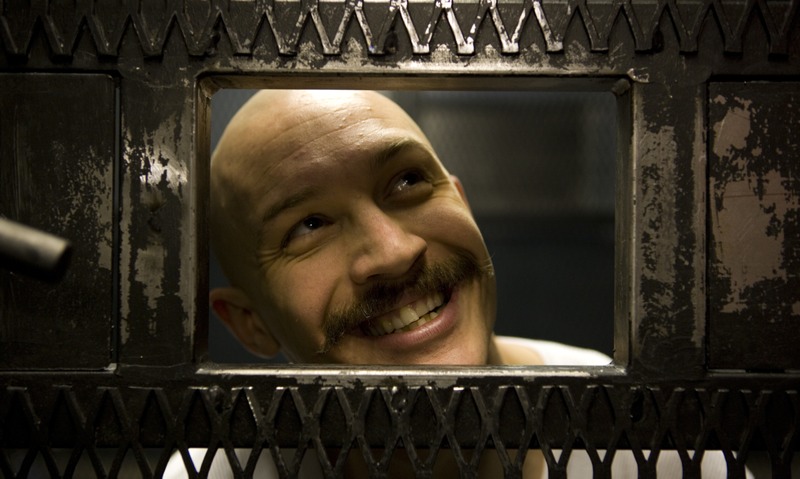
Bronson: Pusher director Nicolas Winding Refn’s Bronson is a blistering biopic of the notorious British felon Michael Gordon Peterson (a.k.a. Charles Bronson), who has spent most of his adult life in solitary confinement, where he has managed to become a physical fitness expert and an award-winning poet and artist. With a grabbag of visual and sonic tricks borrowed from the likes of Kubrick and Peter Greenaway, Refn stages Bronson as a kind of sociopathic vaudeville, as Peterson (played with an all-consuming mania by actor Tom Hardy) recounts his life before an audience, while a series of abstract formalist flashbacks illustrate his violent journey from the crib to various other barred enclosures.(NR) REVIEW BY SCOTT FOUNDAS Uptown: 9:30 p.m., Sat., May 23 (Also: Neptune, 9:30 p.m. Tues., May 26.)
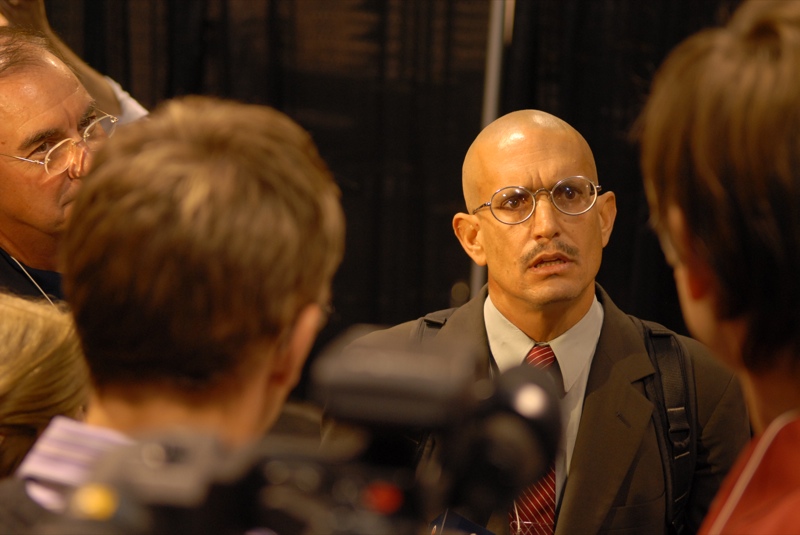
The Yes Men Fix the World: If Michael Moore has taught us anything, it’s that lampooning corporate greed can be a tricky enterprise. Let the ship drift too far off its natural tack, and you just end up looking like a blowhard. It’s lucky then that the angry pranksters behind The Yes Men Fix the World have done their research. Their second documentary sees Andy Bichlbaum and Mike Bonnano, again spanning the globe while impersonating shills for all of your favorite soulless global conglomerates (Dow Chemical, Halliburton, etc.) When easily duped media and conference organizers come a callin’, Bonnano and Bichlbaum–just two of what their press materials claim is a veritable army of like-minded activists–are there to present proposals outrageous, grotesque, and, in one particular case, earnest enough to be plausible. Their Fortune 500 victims are naturally horrified, which is a delight to behold. Exposing the ruthless ethos underlying the corporate mission statement was never so fun. (NR) REVIEW BY VERNAL COLEMAN Neptune: 7 p.m., Fri., May 22. (also 11 a.m. Sat., May 23). Also: Kirkland Performance Center, 4:30 p.m. Thurs., June 4.

Tulpan: The first feature by Russian ethno-documentarian Sergei Dvortsevoy is a fiction founded on a powerful sense of place–and that place, namely the vast nowhere void of southern Kazakhstan, could easily be another planet. The movie is not so much a documentary as it is a dramatic account of a documentary situation. Absence is the operating principle. The movie takes its name from the never-seen object of hour hero’s affections–evidently the only marriageable maiden in the territory. Dvortsevoy populates the inhospitable terrain of the so-called Hunger Steppe with actors who lived as nomadic sheepherders during the course of the shoot. (Askhat Kuchencherekov plays the luckless Asa.) As fluid as Tulpan seems, it’s painstakingly constructed out of a series of observed moments, staged interactions, and precisely dubbed sounds. Call it cacophonous minimalism. Everything makes noise–camels snort, sheep bleat, people declaim, machines sputter. This funkball pantheism suffuses the narrative. Tulpan has a very simple story, but it’s a continuously mysterious experience–at once direct and oblique and very much a show. (NR) REVIEW BY J. HOBERMAN Pacific Place: 4 p.m., Fri., May 22 (also 6:45 p.m. Sun., May 24).
Trimpin: The Sound of Invention: Not a composer, but an inventor of genius was Arnold Schoenberg’s description of John Cage, and the phrase is even more apt for Seattle-based, German-born Trimpin, subject of Peter Esmonde’s doc. As an artist, Trimpin’s staked out territory where sculpture, installations, computer technology, and musical instruments overlap, continuing Cage’s legacy of finding beautiful sounds where no one else would think to look, his DIY, tinkering-in-the-garage spirit, and his unflappable, unaggressive demeanor. Probably his best-known work, locally, is his spectacular tower of self-playing guitars at EMP; Esmonde takes us concisely through the project from conception to completion. He visits a few of Trimpin’s other constructions as well–the locations of which are never identified. It’s an irritation that grows more acute the more beguiling the work; I’d gladly travel to see Trimpin’s Seismofon, arrays of tuned tubes strung across some ceiling somewhere played by automated clappers that respond to Internet-posted earthquake data–but where is it? Is it still up? (Yeah, I could Google it, but that’s no excuse for Esmonde not including any informational captions.) The Seismofon’s warmly woody rippling–imagine that the Close Encounters aliens had a marimba band on that trippy starship–is a prime example of Trimpin’s guiding belief that sound is always the end, gadgetry the means; no matter how intricate his machines, the music that travels from them to your ear is what’s most enthralling. (NR) REVIEW BY GAVIN BORCHERT SIFF Cinema: 7 p.m., Fri., May 22 (also 1:30 p.m. Sat., May 23). Kirkland Performance Center: 4:30 p.m. Mon., June 1.

Treeless Mountain: Kid performers naturally introduce elements of magic and mystery into the most banal of situations. They are most resonant, however, when their characters are compelled to fend for themselves–childhood as an existential condition–as in Morris Engel’s The Little Fugitive (1953), Jafar Panahi’s The White Balloon (1995), or So Yong Kim’s Treeless Mountain. Actually, Treeless Mountain, an American indie made in Korea, doubles the condition by featuring two round-faced, bright-eyed children. Already a latch-key kid with a distracted, prematurely worn mother, six-year-old Jin (Hee-yeon Kim, no relation to the director) is uprooted, along with her younger sister, Bin (Song-hee Kim, unrelated to both), and left in a distant town to stay with a gruffly alcoholic big aunt, while mom goes in search of the girls’ feckless father. Even when the children have been doubly abandoned, dumped by Big Aunt at their maternal grandparents’ farm, Treeless Mountain is skillfully unsentimental–because of, but also despite, the presence of two irresistible, unself-conscious performers in virtually every scene. Taking its title from the barren mound of dirt overlooking the bus stop where the girls last saw their mother, the film is a careful construction. Indeed, it is so closely edited that one is never quite sure how much time has elapsed since the kids were abandoned. But then that’s part of the pathos–neither do they. (NR) REVIEW BY J. HOBERMAN Pacific Place: 6:30 p.m., Fri., May 22 (also 1:15 p.m. Sun., May 24).
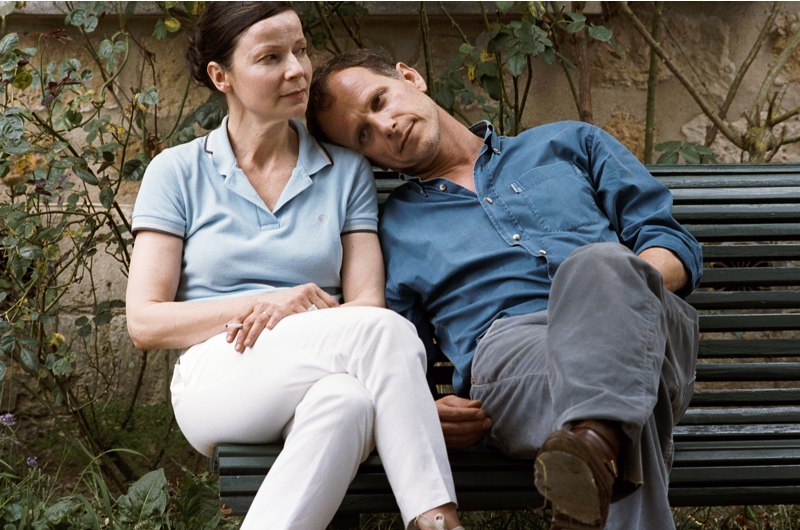
Summer Hours: With Summer Hours, director Olivier Assayas stages a tactical retreat from the hookers and junkies of his Boarding Gate and Clean to the heart of a bourgeois French family. Summer Hours opens with a gaggle of first cousins romping around the verdant grounds of the rustic estate, somewhere north of Paris, where their parents grew up. The occasion is a 75th-birthday celebration for their chic grandmother, Helene (Edith Scob). Assayas, who has always excelled at choreographing a fete, uses the first half-hour to introduce Helene’s three grown children, as well as her devotion to the estate. For all the local color, there’s a global backbeat: The youngest child (Jeremie Renier) runs a Puma factory in China; his sister (Juliette Binoche) is a New York designer; and, though living in Paris, the eldest son, Frederic (Charles Berling), is an economist. Lunch devoured, everyone rushes off, leaving Helene to sit in the dark. She’s alone — and she does die, off-screen, perhaps a year later. Too chatty to be ascetic, Summer Hours is nevertheless almost Ozu-like in its evocation of a parent’s death and the dissolving bond between the surviving children. It’s also an essay on the nature of sentimental and real value — as well as the need to protect French culture in a homogenizing world. Assayas has his own preservationist agenda. Praised as classically French by the hipsters of culture weekly Les Inrockuptibles, Summer Hours exemplifies, even as it ponders, France in the age of unstoppable globalization. (NR) REVIEW BY J. HOBERMAN SIFF Cinema: 4:30 p.m., Fri., May 22 (Also: Uptownm 6:30 p.m. Sun. May 24.)

Nurse. Fighter. Boy: Move past the title of this affecting little Canadian drama. The plot is familiar, and we’ve seen these characters many, many times before. Yet the movie directly acknowledges its own archetypes, beginning with the title, then infuses them with Caribbean mysticism, folklore, and music. A Jamaican immigrant nurse (Karen LeBlanc) is the single parent to a boy (Daniel J. Gordon) about 13 years old. She rides her bike to work along weedy back alleys in the working-class quarter of an unnamed city. Meanwhile at home, her boy is a latchkey kid, left alone to contemplate the paternal and spiritual void in his life (yes, it’s that kind of movie). Also, a cute girl next door has a crush on him. The film is color-coded, and mother and son live in a warm, reddish, voodoo cocoon. Out in the cold blue world, a boxer (TV veteran Clark Johnson of The Wire and Homicide) fights for cash in the street. He’s alone, but he takes to training kids at the local gym. All three leads bring heartfelt plausibility to roles wrapped in magical, New Age sentiment. NFB is the kind of movie that, in outline, I’d usually hate. But it’s to the great credit of writer-director Charles Officer that the whole corny, mumbo-jumbo pie actually works. And it helps, too, that the high-def photography is so well lit for the black skin of his three fine leads. (NR) REVIEW BY BRIAN MILLER Harvard Exit: 7 p.m., Fri., May 22 (also 4:30 p.m. Sat., May 23 and Admiral, 1:30 p.m. Sat., June 6).
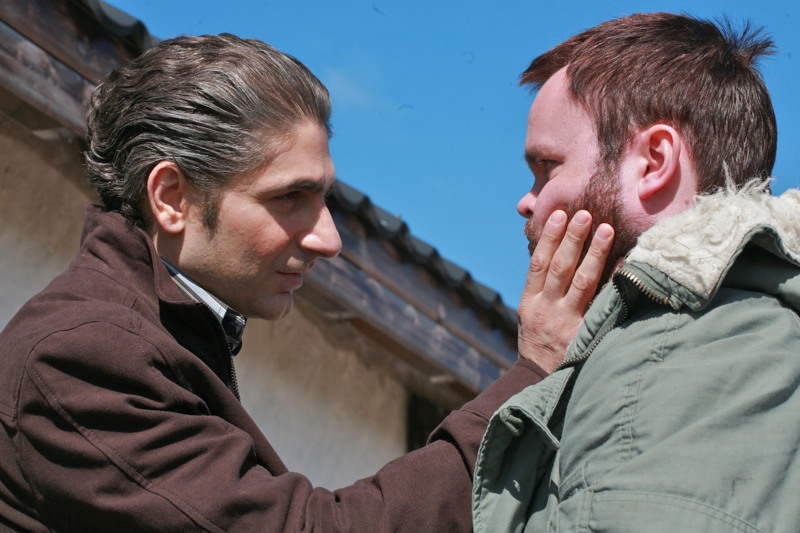
The Higher Force: Yo, wassup! This movie’s strait outta South Central. But I’m talking about South Central ReykjavAƒAk, where David and his homies form possibly the worst band of criminals in cinema history. (Or at least Icelandic cinema history.) The Higher Force takes its name from the instructional/inspirational Kung Fu lessons our hero watched on VHS as a boy. The lessons didn’t take. In his 20s, aspiring poet David (Petur Johann Sigfusson) is still just a pudgy, flunky loan collector in a gang whose uniform seems to be track suits, NBA jerseys, and cornrows. (Some even sport grills!) The women are so tacky they’d look up to Britney Spears. The wangstas are so weak that they listen to hip-hop on cassette tape. In an all-white country, they’re poor white Viking trash. David’s stock rises within the gang, however, when he implicates a lonely old school teacher as being, in secret, a top-level mobster. His VHS guru tells David, Nothing is as it seems, which seems to be the operating principle behind this scruffy gangster spoof by Olaf de Fleur Johannesson. At a certain point, Michael Imperioli even appears to impart a little Sopranos cred (most of the dialogue’s in English). None of it makes any sense; all of it made me laugh. (NR) REVIEW BY BRIAN MILLER Egyptian: 4:30 p.m. (Also: Neptune, 7 p.m. Wed., May 27.)

The Exploding Girl: Zoe Kazan–the only actor who didn’t chew and spit out the scenery in Revolutionary Road–finds a much worthier vehicle for her talents in Bradley Rust GrayA¢a‚¬a„¢s lovely film about a young woman at home in NYC during a semester break. When not palling around with Al Mark Rendall or enduring a series of maddening cell phone calls with her boyfriend, Kazan’s Ivy is frequently seen in moments of silent contemplation while the city blooms and bustles around her. (NR) REVIEW BY MELISSA ANDERSON Pacific Place: 7 p.m. (also 1:30 p.m. Sat., May 23).
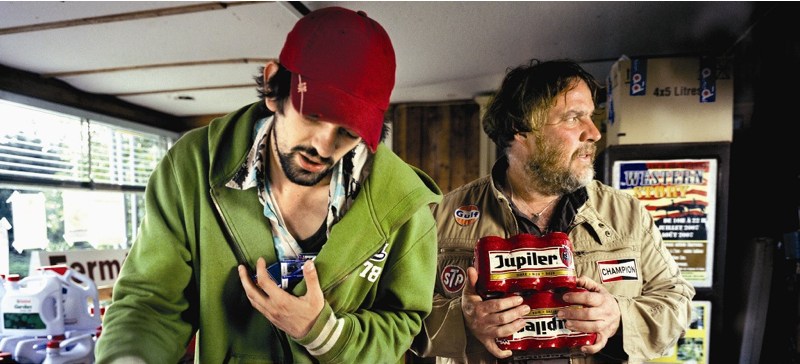
Eldorado: The title of Bouli Lanners’ modest yet surprisingly affecting road-trip/buddy movie, which refers to an imaginary place of great wealth and opportunity, isn’t necessarily ironic: The writer-director-actor has a profound love for the flat expanses of the film’s southern Belgium and its gas stations, snack shops, and RV parks. Eldorado is a tale of two guys, fat and thin: Stroppy vintage-car dealer Yvan (Lanners, dressed like a Walloon Kevin Smith) comes home one night to find smack-scrawny Elie (Fabrice Adde) robbing him. Instead of calling the cops, Yvan becomes oddly protective of the pathetic felon and offers to drive him to his parents’ house near the French border. The voyage provides both lovely shots of low-country landscapes — which suggest not the starker palette of Dardenne brothers’ territory, but magic-hour prairie heartland — and genuinely funny encounters with weirdos (a car-accident fetishist, a nudist named Alain Delon). When the traveling companions reveal their backstories, the monologues avoid mawkishness, further upending all low expectations of this frequently trite genre. In its final act, Lanners’ film is smart and confident enough to acknowledge that certain lives are dead ends while others get tired of just spinning their wheels. (NR) REVIEW BY MELISSA ANDERSON Harvard Exit: 4:30 p.m., Fri., May 22 (Also: Pacific Place, 9 p.m. Mon., May 25.)
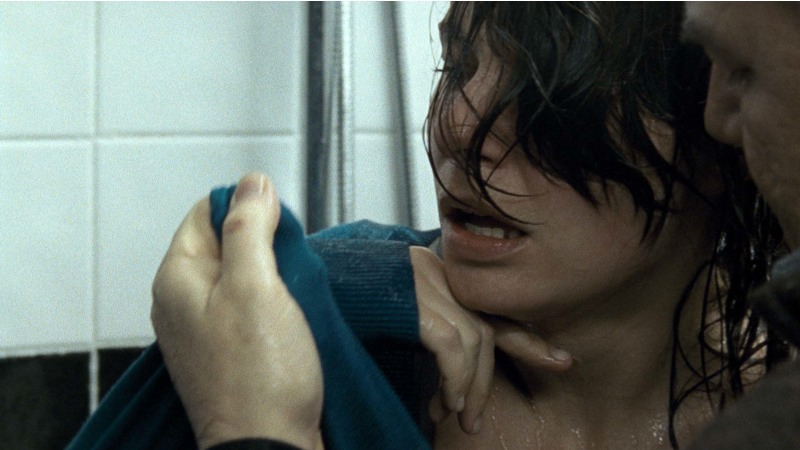
Can Go Through Skin: In her harrowing debut feature, Dutch director Esther Rots skillfully evokes the psychological effects of assault. Just recovering from a breakup, thirtysomething Marieke is attacked in her bath by a pizza delivery boy. She flees her Amsterdam apartment for a frozen rural shack, which she starts to clean up in a release of pent-up fury. But a new home, new kittens, and even a new relationship with a burly villager can’t subdue her intensifying anger and paranoia. She begins to plot her revenge against her attacker, encouraged by a fellow victim she meets in an online chatroom. In her fragile state of mind, Marieke feels her grip on reality slipping in this uncompromising and tough-minded work. (NR) REVIEW BY FRAKO LODEN Pacific Place: 9:30 p.m., Fri., May 22 (Also: Uptown, 11 a.m. Sun., May 24.)





